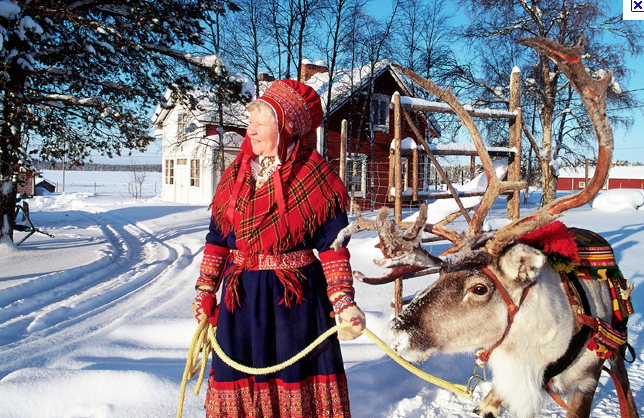Travel & Hospitality
Lapland Travel Guide: Discover Arctic Wonders and Sami Culture

Introduction
Welcome to your ultimate Lapland travel guide, where Arctic wonders meet the living heritage of Sami culture. Nestled across northern Norway, Sweden, Finland, and Russia, Lapland offers snow-covered forests, dazzling Northern Lights, and warm Sami traditions. Whether you dream of visiting Santa Claus Village in Rovaniemi, chasing the Aurora Borealis, or learning about reindeer herding, this guide will help you plan an unforgettable trip. Packed with easy-to-follow tips, top attractions, and local insights, you’ll be ready to experience Lapland’s magic like never before.
Why Visit Lapland?
Lapland is more than just a winter destination. Here’s why travelers fall in love with this Arctic region:
- Natural Beauty: Endless forests, frozen lakes, and snow-clad fells create a pristine white landscape.
- Northern Lights: Clear, dark skies make Lapland one of the best places on Earth to see the Aurora Borealis.
- Unique Culture: The Sami people have thrived here for millennia, sharing their traditions in food, crafts, and storytelling.
- Adventure Activities: From husky sled rides to ice fishing, Lapland offers outdoor fun for all ages.
- Year-Round Appeal: While winter brings snow adventures, summer’s Midnight Sun allows round-the-clock exploration.
With something for every traveler, Lapland promises memories you’ll treasure forever.
Geography and Climate
Lapland spans four countries, but Finnish Lapland is the most visited. Key facts:
- Latitude: Between 66° and 70° North, above the Arctic Circle.
- Terrain: Boreal forests, fells (low mountains), and thousands of lakes.
- Climate:
- Winter (Dec–Mar): Long, cold, and snowy, with temperatures often below –20 °C (–4 °F).
- Spring (Apr–May): Snow begins to melt; daylight grows rapidly.
- Summer (Jun–Aug): Mild, with temperatures around 10–20 °C (50–68 °F) and the Midnight Sun.
- Autumn (Sep–Nov): Cooler days, early snow, and stunning fall colors.
Pack layers and prepare for sharp temperature swings, especially in winter.
Best Times to Visit
Choosing when to go depends on your interests:
- Winter (December–March): Ideal for snow activities and Northern Lights hunting.
- Spring (April–May): Longer daylight, fewer tourists, and still enough snow for fun.
- Summer (June–August): Experience the Midnight Sun, wildflowers, and hiking.
- Autumn (September–November): Crisp air, autumn hues, and early Aurora sightings.
Peak season is December–February. For lower prices and fewer crowds, aim for late February or March.
Top Attractions
Northern Lights
Watching the Northern Lights dance across the sky is Lapland’s top draw. Best spots include:
- Abisko National Park (Sweden): Known for clear skies and a “Blue Hole” microclimate.
- Tromsø (Norway): Offers guided chases and cozy Aurora camps.
- Rovaniemi Surroundings (Finland): Local operators provide Aurora alerts and heated glass igloos.
Santa Claus Village
Located in Rovaniemi, Santa Claus Village delights all ages. Don’t miss:
- Meeting Santa Claus any day of the year.
- Crossing the Arctic Circle line.
- Sending postcards from the Santa Claus Main Post Office.
- Husky and reindeer sleigh rides nearby.
Sami Cultural Experiences
To immerse in Sami culture, seek out:
- Reindeer Farms: Learn about herding, feed tame reindeer, and take a short sleigh ride.
- Sami Crafts Workshops: Try traditional joik singing or carve wooden handicrafts.
- Sami Museums: The Arktikum in Rovaniemi and Ájtte in Jokkmokk (Sweden) showcase Sami history.
Husky Safaris
Feel the thrill of a husky sled ride through silent forests. Tours range from short trips to overnight wilderness excursions under the stars.
Ice Hotel and Glass Igloos
For a unique stay:
- SnowHotel (Sweden): Rebuilt each winter from ice and snow.
- Kakslauttanen Arctic Resort (Finland): Glass igloos let you watch the Aurora from your bed.
Outdoor Activities
Lapland’s landscape invites all kinds of adventures:
- Snowmobiling: Cover miles of snow-covered trails at speed.
- Cross-Country Skiing: Hundreds of kilometers of groomed tracks for all skill levels.
- Snowshoeing: Explore off-trail areas quietly and easily.
- Ice Fishing: Drill a hole in frozen lakes and try your luck catching trout or perch.
- Ice Hotel Visits: Tour intricate ice sculptures and ice bars.
Each activity offers a fresh perspective on Lapland’s wintry magic.
Local Cuisine
Lapland’s food reflects its Arctic roots:
- Reindeer Meat: Tried sautéed (poronkäristys) or in stews.
- Arctic Char & Salmon: Fresh from lakes and rivers.
- Cloudberries: A golden berry used in jams and desserts.
- Bread & Dairy: Rye bread and local cheeses like leipäjuusto (squeaky cheese).
Warm up with a cup of hot berry juice or traditional glögi (spiced mulled wine).
Travel Tips and Logistics
Getting There
- By Air: Direct flights to Rovaniemi (Finland), Kiruna (Sweden), Tromsø (Norway), or Murmansk (Russia).
- By Train: The scenic Arctic Circle Express runs to Rovaniemi from Helsinki.
- By Road: Well-maintained highways link major towns, but winter driving requires studded tires.
Accommodations
Options range from luxury glass igloos to rustic cabins and hostels. Book early for winter highs.
What to Pack
- Warm Layers: Thermal base, fleece mid-layers, insulated jackets.
- Waterproof Outerwear: Snow pants and parka with a windproof shell.
- Winter Boots: Insulated, waterproof, and with good traction.
- Accessories: Hat, gloves, scarf, and wool socks.
- Other Essentials: Sunglasses for snow glare, lip balm, and camera with extra batteries (cold drains power).
Sustainable Travel
Respect Lapland’s fragile environment and Sami traditions:
- Stay on Trails: Avoid damaging tundra vegetation.
- Support Local Businesses: Hire Sami guides and eat at family-run eateries.
- Reduce Waste: Carry reusable water bottles and avoid single-use plastics.
- Learn Sami Customs: Ask permission before photographing sacred sites or traditional events.
Responsible travel ensures Lapland’s wonders endure for generations to come.
Conclusion
Lapland truly is a land of Arctic wonders and rich Sami culture. Whether you chase the Northern Lights, meet reindeer in snow-quiet forests, or explore summer’s Midnight Sun, this Lapland travel guide equips you with the knowledge to plan an unforgettable trip. From practical tips on packing and transport to immersive cultural experiences and local cuisine, Lapland offers something for every traveler. Embrace the magic of the Arctic and the warmth of Sami hospitality. Your adventure in Lapland awaits—start your journey today, and create memories that will last a lifetime.
Autos & Vehicles
Amtrak Route 128 Westwood MA: Your Convenient Transportation

Amtrak Route 128 Westwood MA is a major transportation node in the Route 128 station. This station is operated by Amtrak and serves as a convenient rail link for both local and long-distance travelers. Route 128 station, located in Westwood, Massachusetts, is famous for its accessibility, modern infrastructure, and prime location on the Northeast Corridor.
Passengers traveling via Amtrak Route 128 Westwood MA enjoy frequent train operations that link major cities like Boston, New York, Providence, and Washington, D.C. The station has parking garages, waiting rooms, ticketing facilities, and easy highway access, making it a popular destination for passengers seeking to avoid downtown traffic. Business travelers and tourists alike depend on this station for its convenient schedules and comfortable rail travel.
Overview of Amtrak Route 128 Westwood MA Station
The Amtrak Route 128 Westwood MA station is officially known as Route 128 Station and is located at:
- 1285 University Ave, Westwood, MA 02090
- This station is an important stop on Amtrak’s Northeast Corridor line. It is also served by MBTA commuter rail, making it an excellent transfer station for both local and long-distance travelers.
- Route 128 Station is well-known for its clean facilities, easy parking access, and convenient location near major highways like I-95 and Route 128.

Why Choose Amtrak Route 128 Westwood MA?
Many travelers prefer Amtrak Route 128 Westwood MA instead of Boston South Station because it offers:
- Less crowded platforms
- Easier parking options
- Faster highway access
- Smooth drop-off and pickup area
- Convenient connections to MBTA commuter rail
For passengers living in the suburbs like Westwood, Dedham, Norwood, Canton, or even Providence, Route 128 is often the best alternative.
Amtrak Route 128 Westwood MA is an important transportation hub in Route 128 station, serving travelers across the Boston metropolitan area. Operated by Amtrak, this station provides convenient rail connections for both regional commuters and long-distance passengers. Located in Westwood, Massachusetts, Route 128 station is known for its accessibility, modern facilities, and strategic position along the Northeast Corridor.
Passengers using Amtrak Route 128 Westwood MA benefit from frequent train services connecting major cities such as Boston, New York, Providence, and Washington, D.C. The station features parking garages, waiting areas, ticketing services, and easy highway access, making it a preferred choice for travelers looking to avoid downtown congestion. Business travelers and tourists alike rely on this station for reliable schedules and comfortable rail journeys.
Amtrak Routes Available at Route 128 Westwood MA
The Amtrak Route 128 Westwood MA station is primarily served by trains operating on the Northeast Corridor. This means you can travel directly to several major cities.
Popular destinations include:
- Providence, RI
- New Haven, CT
- Stamford, CT
- New York City (Penn Station)
- Philadelphia, PA
- Baltimore, MD
- Washington, D.C.
This station is served by major Amtrak services such as:
- Amtrak Northeast Regional
- Amtrak Acela (select trains)
If you are commuting between Boston and New York frequently, Route 128 is a smart station to use.
Amtrak Acela at Route 128 Westwood MA
One of the biggest advantages of Amtrak Route 128 Westwood MA is that it supports select Acela high-speed trains. Acela is Amtrak’s premium service, offering faster travel time and business-class seating.
If you want to reach New York City in less time, Acela trains from Route 128 are a great option. Amtrak Route 128 Westwood MA is an important transportation hub in Route 128 station, serving travelers across the Boston metropolitan area. Operated by Amtrak, this station provides convenient rail connections for both regional commuters and long-distance passengers.
Located in Westwood, Massachusetts, Route 128 station is known for its accessibility, modern facilities, and strategic position along the Northeast Corridor. Passengers using Amtrak Route 128 Westwood MA benefit from frequent train services connecting major cities such as Boston, New York, Providence, and Washington, D.C. The station features parking garages, waiting areas, ticketing services, and easy highway access, making it a preferred choice for travelers looking to avoid downtown congestion. Business travelers and tourists alike rely on this station for reliable schedules and comfortable rail journeys.
MBTA Connection at Route 128 Station
Route 128 Station is not only an Amtrak station it’s also an MBTA commuter rail station.
The MBTA Providence/Stoughton Line stops here, making it easy for travelers to connect between:
- Boston South Station
- Back Bay Station
- Providence Station
This makes Amtrak Route 128 Westwood MA a key transportation hub for both daily commuters and long-distance travelers.
Parking at Amtrak Route 128 Westwood MA
Amtrak Route Parking is one of the biggest reasons travelers prefer Route 128 Station.
Parking Features:
- Large parking garage and surface lots
- Paid parking available daily
- Accessible parking spaces
- Safe and well-lit parking areas
If you’re traveling for a weekend trip or a business visit, Route 128 parking is far easier compared to downtown Boston stations.
Parking Tips:
- Arrive early during peak travel times
- Keep your ticket or payment receipt safe
- Use the garage if traveling during winter for extra protection
The Amtrak Route 128 Westwood MA parking area is ideal for long-distance travelers who want peace of mind while leaving their car behind.
Station Facilities and Amenities
Amenities include:
- Indoor waiting area
- Restrooms
- Ticket vending machines
- Amtrak ticket counter (limited hours)
- Elevators and escalators
- Accessible boarding platforms
- Wi-Fi access in some areas
- Nearby food and coffee options
The station is designed to be comfortable for both short and long waits.
Location and Instructions for Amtrak Route 128 Westwood MA
The station is located close to major highways, making it very easy to reach.
Best ways to reach the station:
- From Boston: Drive south via I-95
- From Providence: Drive north via I-95
- From nearby towns: Use Route 1 or Route 128
The station is near University Avenue in Westwood, which also has shopping centers, restaurants, and business offices.
If you’re using GPS, search Amtrak Route 128 Westwood MA for the most accurate directions.
Ticket Booking Options
Booking tickets for Amtrak Route 128 Westwood MA is simple. You can purchase tickets through:
- Amtrak official website
- Amtrak mobile app
- Ticket vending machines at the station
- Ticket counter (if open)
It’s recommended to book early, especially for Acela trains, as prices rise closer to departure.
Travel Tips for Route 128 Station
If you’re planning to use Amtrak Route 128 Westwood MA, here are some helpful travel tips:
1. Arrive Early
Try to arrive at least 30–45 minutes before departure, especially if you need parking.
2. Keep Your Ticket Ready
Amtrak conductors usually scan tickets onboard, so keep your phone or printed ticket accessible.
3. Choose Your Seat Quickly
On Northeast Regional trains, seating is often open. Boarding early helps you get a better seat.
4. Watch for Platform Announcements
Pay attention to digital boards and announcements, as platform changes may happen.
5. Use Route 128 for Faster Pickup
If someone is picking you up, Route 128 is easier than downtown Boston stations.
Nearby Hotels and Attractions
If you’re traveling through Amtrak Route 128 Westwood MA, there are plenty of nearby hotels and attractions.
Nearby Hotels:
- Courtyard by Marriott Boston Dedham/Westwood
- Hilton Garden Inn Foxborough
- Hampton Inn Boston Norwood
Nearby Attractions:
- Legacy Place Shopping Center
- University Station shopping and dining
- Gillette Stadium (short drive)
- Blue Hills Reservation
This makes Route 128 an excellent stop for both business and leisure travelers.
Is Amtrak Route 128 Westwood MA Better Than Boston South Station?
For many travelers, yes.
Route 128 is better if you:
- Want easier parking
- Prefer less crowded station platforms
- Live outside Boston
- Want faster highway access
South Station is better if you:
- Are already in downtown Boston
- Need access to subway lines
- Want more food and shopping options inside the station
Overall, Amtrak Route 128 Westwood MA is a great alternative for anyone traveling from suburban Boston areas.
Final Thoughts
The Amtrak Route 128 Westwood MA station is one of the best and most convenient train stations in the Greater Boston region. With access to Amtrak Northeast Regional, select Acela services, MBTA commuter rail connections, and easy parking, it is a top choice for both commuters and long-distance travelers.
Consumer Services
How eSIM Can Save You Money While Traveling Internationally

Traveling internationally can often lead to higher costs, especially when it comes to mobile data usage and roaming charges. But there are ways to cut down on these costs and still stay connected. One such solution is eSIM—a digital SIM card that can help you manage your mobile expenses while traveling abroad. Not only can eSIM help you avoid high roaming fees, but it also offers flexibility and convenience in managing your data usage. Here’s how you can leverage eSIM to stay within your budget and make the most of your funds.
Why eSIM Is the Intelligent Option for Cost Savings
1. No Roaming Charges
When you use an eSIM, you won’t face the usual roaming charges that come with using a traditional SIM card abroad. This eliminates the extra costs of roaming services, which often add up quickly.
- Save on daily mobile bills: With eSIM, you can avoid unexpected fees and control your mobile expenses.
- Local Rates: By switching to a local eSIM, you can connect to local networks at local rates, reducing your costs significantly.
This is an especially useful feature if you’re traveling to multiple countries or staying for an extended period, as it allows you to always stay connected without the burden of high roaming fees.

2. Flexible Data Plans
With eSIM, you can easily choose the data plan that best suits your needs, whether you need just a few gigabytes or a more extensive plan. No need to buy a massive unlimited data plan that you might not use.
- Budget-friendly data options: Pay only for the data you need by selecting smaller, tailored data packages like 3GB instead of opting for expensive unlimited plans.
- Tiered plans: Choose a data plan that fits your travel schedule, whether it’s for a day, week, or month.
This level of control over your data expenses can make a big difference when managing your travel budget.
3. Zero Physical SIM Fees
One of the key benefits of using eSIM is that there are no physical SIM card fees, which you would typically incur when purchasing a local SIM card at an airport or store.
- No need for a new SIM card: With eSIM, you simply activate the plan digitally, saving you the hassle of finding local providers or waiting in long lines.
- Cost savings on physical SIM cards: Many providers charge extra for a physical SIM card, especially if you’re purchasing it at the airport or a tourist destination.
By switching to eSIM, you can avoid these added costs.
How to Set Up Your eSIM for International Travel
Setting up an eSIM is simple and can be done before you even leave home, making it an ideal solution for international travelers. Here’s how to get started:
Check Compatibility
- Make sure your device supports eSIM technology. Most modern smartphones, such as the latest iPhones, Samsung Galaxy models, and Google Pixels, support eSIM.
- Ensure that your device is unlocked to accept eSIM profiles from different carriers.
Purchase Your eSIM Before You Travel
- Subscribe to an eSIM plan through a trusted provider before you board your flight. Many providers offer eSIM packages specifically for international travelers.
- You can purchase eSIM plans through the provider’s website or via online marketplaces, so you have everything ready to go once you land.
Activate eSIM on Your Device
- Upon purchasing your eSIM, you’ll typically receive a QR code that you’ll scan through your device’s settings.
- Alternatively, you can activate your eSIM by accessing the carrier settings in your phone’s network settings.
Turn on Data Roaming
- Once the eSIM is set up, ensure that you enable data roaming on your phone. This allows you to use your international eSIM plan seamlessly, and you can start browsing the web or using apps without worrying about unexpected charges.
Additional Tips for Saving Money with eSIM
While using eSIM can save you a lot of money, there are a few additional steps you can take to further optimize your data usage and keep your travel budget intact:
- Use Messaging Apps via Browser: Instead of constantly using mobile data for messaging apps like WhatsApp or Telegram, use their web-based versions whenever possible to save on data.
- Download Offline Maps: Download maps or guides for your destination ahead of time so you can navigate without using data. Google Maps and other map apps allow offline access once you’ve downloaded the relevant areas.
- Use Wi-Fi Whenever Possible: Rely on public Wi-Fi in cafes, hotels, or airports to reduce your data usage.
These simple practices will help you conserve data, which is particularly useful when you have a limited plan.
Managing Emergency Funds for Your Travel
While eSIM helps with your mobile expenses, it’s also important to ensure you’re prepared for other financial challenges during your travels. Here are a few tips for managing emergency funds:
- Borrow from Direct Lenders: If you’re in urgent need of funds, consider borrowing from a direct lender through an online application. This allows you to get quick access to the money you need without unnecessary delays.
- Utilize Savings: Draw from your emergency savings account, which you’ve set aside for travel purposes, to cover any unexpected expenses.
- Ask for Family Support: If you’re in a tight spot, reaching out to family or friends for assistance can be a quick way to get the support you need.
- Break Emergency Savings: If you have an emergency savings fund, don’t hesitate to break into it if necessary. Ensure that you use it strategically for essential expenses.
- Use Liquid Assets: If you have liquid assets (like stocks or bonds), consider liquidating them to cover your travel needs.
Conclusion: Why eSIM is a Game Changer for Travelers
eSIM is revolutionizing how we manage mobile expenses while traveling abroad. By eliminating roaming charges, offering flexible data plans, and removing the need for physical SIM cards, eSIM makes it easier to stay within your budget while traveling. Combine it with the right financial strategies, and you’ll be able to manage your travel experience more efficiently, without the stress of escalating bills.
When traveling abroad, eSIM is not just a tool for staying connected—it’s a smart way to keep your finances on track. Use it wisely and pair it with emergency fund management to optimize your spending and ensure a smoother, more affordable trip.
Development
Australian Migration: Expert Support for Travel Dreams

Australia is not just a country people visit—it is a place people fall in love with. From iconic city skylines and pristine beaches to world-class education and global career opportunities, Australia has a way of turning short trips into lifelong dreams. Many travelers arrive with a suitcase and a return ticket, only to realize that they want to stay longer and build a future here.
The journey from traveler to resident, however, requires more than excitement. Australian migration visa rules are detailed, structured, and constantly evolving. Without proper guidance, even well-intentioned travelers can feel lost. This is where professional migration support becomes the key to a smooth and stress-free transition.
When Travel Experiences Lead to Migration Goals
For most people, migration begins with travel. A student comes for education, a professional arrives on a temporary work visa, or a visitor explores the country while meeting family or friends. Over time, Australia’s lifestyle, safety, and opportunities begin to feel like home.
Common travel experiences that often lead to migration decisions include:
- Studying at Australian universities and adapting to local culture
- Working temporarily and gaining international experience
- Visiting loved ones and forming long-term relationships
- Exploring different cities to find the right lifestyle fit
As these experiences grow, travelers start asking important questions about extending their stay legally. At this stage, guidance from experienced Australian visa professionals
helps travelers understand which pathways are realistic and suitable for their long-term plans.

Why Expert Guidance Makes Travel-to-Migration Easier
Australia’s immigration system is built on strict criteria, documentation accuracy, and timelines. Relying on outdated online advice or informal suggestions can lead to refusals or unnecessary delays.
Professional migration agents simplify the process by:
- Reviewing travel history, qualifications, and skills
- Identifying visa options that align with future goals
- Ensuring documentation meets legal requirements
- Managing deadlines and communication
For travelers, this level of support feels similar to hiring a local guide while exploring a new country. Instead of uncertainty, there is structure and confidence at every step.
Visa Pathways That Appeal to Travelers
Australia offers a wide range of visa options that naturally suit travelers who want to stay longer or settle permanently. Each pathway serves a different purpose and requires careful planning.
Popular options include:
- Student visas with post-study work opportunities
- Skilled migration visas for qualified professionals
- Employer-sponsored visas for experienced workers
- Partner and family visas for genuine relationships
Choosing the wrong pathway can slow down progress or close future options. That’s why travelers often turn to licensed MARA migration advisors in Australia
who ensure every decision supports both current travel plans and future residency goals.
How Migration Agents Support the Travel Journey
Migration experts understand that for travelers, migration is not just a legal process—it is a life transition. Their role goes beyond form filling and application submission.
They assist travelers by:
- Creating personalized migration strategies
- Explaining risks, timelines, and realistic outcomes
- Preparing applicants for visa changes and extensions
- Offering guidance even after approval
This ongoing support allows travelers to focus on settling into Australian life—finding housing, adjusting to work culture, and exploring new surroundings—without constant stress about visa compliance.
Turning a Temporary Stay Into a Long-Term Plan
Many travelers arrive in Australia without knowing how temporary visas connect to permanent residency pathways. With the right guidance, short-term stays can be transformed into structured long-term plans.
Migration professionals help travelers:
- Understand how current visas affect future options
- Avoid actions that may harm eligibility
- Plan education, work, and location strategically
- Stay compliant with Australian immigration laws
This long-term perspective ensures that each step taken today supports future opportunities rather than limiting them.
Trust and Transparency While Living Abroad
When living or traveling in a foreign country, trust becomes essential. Travelers want professionals who are honest, transparent, and focused on lawful outcomes rather than shortcuts.
Reliable migration guidance is defined by:
- Clear and realistic assessments
- Ethical and compliant processes
- Consistent communication
- Focus on sustainable migration outcomes
This trust gives travelers peace of mind, allowing them to enjoy Australia’s lifestyle without constant anxiety about their legal status.
Migration Is a Journey, Just Like Travel
Just as travel requires planning, budgeting, and preparation, migration demands patience and informed decisions. Rushing applications or following incorrect advice can lead to setbacks that delay dreams for years.
Australia rewards those who plan carefully. With expert support, travelers can move confidently from visitor status to long-term residency, creating a future that aligns with their aspirations.
Final Thoughts
Australia attracts people with its beauty, but it keeps them with opportunity. Turning a travel experience into a stable future requires more than passion—it requires expert guidance and careful planning.
With professional Australian migration support, the visa process becomes clear, organized, and stress-free. Just like every great journey deserves a reliable map, your migration journey deserves trusted experts who understand both the legal framework and the dreams that drive it.
-
Business3 years ago
Cybersecurity Consulting Company SequelNet Provides Critical IT Support Services to Medical Billing Firm, Medical Optimum
-
Business3 years ago
Team Communication Software Transforms Operations at Finance Innovate
-
Business3 years ago
Project Management Tool Transforms Long Island Business
-
Business2 years ago
How Alleviate Poverty Utilized IPPBX’s All-in-One Solution to Transform Lives in New York City
-
health3 years ago
Breast Cancer: The Imperative Role of Mammograms in Screening and Early Detection
-
Sports3 years ago
Unstoppable Collaboration: D.C.’s Citi Open and Silicon Valley Classic Unite to Propel Women’s Tennis to New Heights
-
Art /Entertainment3 years ago
Embracing Renewal: Sizdabedar Celebrations Unite Iranians in New York’s Eisenhower Park
-
Finance3 years ago
The Benefits of Starting a Side Hustle for Financial Freedom






























